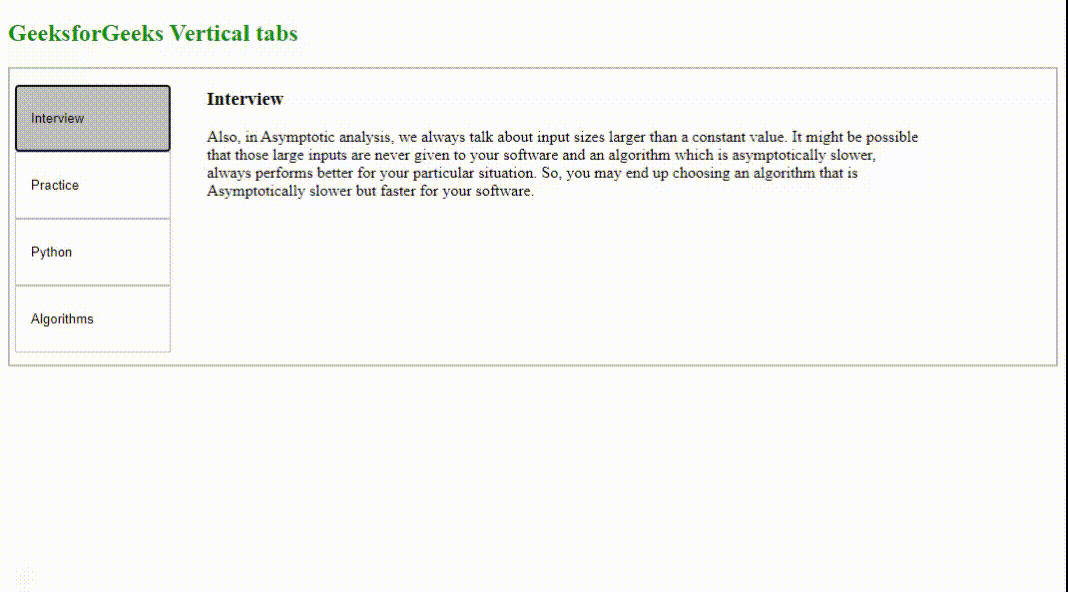JavaScript 如何创建横向和纵向选项卡
在本文中,我们将使用JavaScript创建横向和纵向选项卡。
选项卡可用于以有组织的方式在单个页面上显示大量内容。我们可以使用HTML、CSS和JavaScript来设计单页面选项卡。使用HTML元素来设计选项卡的结构和段落中的内容。使用CSS进行样式设置。每个选项卡按钮的点击将显示其相应的内容。这是通过JavaScript实现的。
横向选项卡
以下代码演示了具有选项卡和其内容的简单HTML结构。每个选项卡按钮的点击调用在下面的“script.js”文件中实现的displayContent()方法。
示例: 下面的示例展示了创建横向选项卡。
<!DOCTYPE html>
<html>
<head>
<link rel="stylesheet" href="style.css">
<script src="script.js"></script>
</head>
<body>
<h2 style="color:green">
GeeksforGeeks Horizontal tabs
</h2>
<!-- Link to each tab with onclick event -->
<div id="tabsDiv">
<button class="linkClass" onclick=
"displayContent(event, 'interview')">
Interview
</button>
<button class="linkClass" onclick=
"displayContent(event, 'practice')">
Practice
</button>
<button class="linkClass" onclick=
"displayContent(event, 'python')">
Python
</button>
<button class="linkClass" onclick=
"displayContent(event, 'algorithms')">
Algorithms
</button>
<button class="linkClass" onclick=
"displayContent(event, 'machine')">
Machine Learning
</button>
</div>
<!-- Content for each HTML tab -->
<div id="interview" class="contentClass">
<h3>Interview</h3>
<p>
Also, in Asymptotic analysis, we always
talk about input sizes larger than a
constant value. It might be possible
that those large inputs are never given
to your software and an algorithm which is
asymptotically slower, always performs
better for your particular situation.
So, you may end up choosing an algorithm
that is Asymptotically slower but faster
for your software.
</p>
</div>
<div id="practice" class="contentClass">
<h3>Practice</h3>
<p>
Asymptotic Analysis is the big idea
that handles above issues in analyzing
algorithms. In Asymptotic Analysis,
we evaluate the performance of an
algorithm in terms of input size (we
don’t measure the actual running time).
We calculate, how does the time
(or space) taken by an algorithm
increases with the input size.
</p>
</div>
<div id="python" class="contentClass">
<h3>Python</h3>
<p>
Python is a high-level, general-purpose
and a very popular programming language.
Python programming language (latest Python 3)
is being used in web development, Machine
Learning applications, along with all
cutting edge technology in Software Industry.
Python Programming Language is very well
suited for Beginners, also for experienced
programmers with other programming languages
like C++ and Java.
</p>
</div>
<div id="algorithms" class="contentClass">
<h3>Greedy Algorithms</h3>
<p>
Greedy is an algorithmic paradigm that
builds up a solution piece by piece,
always choosing the next piece that
offers the most obvious and immediate
benefit. So the problems where
choosing locally optimal also
leads to global solution are
best fit for Greedy.
</p>
</div>
<div id="machine" class="contentClass">
<h3>Machine Learning</h3>
<p>
Machine Learning is the field of
study that gives computers the capability
to learn without being explicitly
programmed. ML is one of the most
exciting technologies that one
would have ever come across.
As it is evident from the name,
it gives the computer that makes
it more similar to humans:
The ability to learn. Machine learning
is actively being used today,
perhaps in many more places than
one would expect.
</p>
</div>
</body>
</html>
CSS代码
h3 {
text-align: left;
}
/* Button to open the content */
.linkclass {
float: left;
cursor: pointer;
padding: 10px 15px 10px 10px;
background-color: light-grey;
}
/* Button styling on mouse hover */
#tabsDiv a:hover {
color: black;
background-color: #e9e9e9;
font-size: 16px;
}
/* Change the color of the button */
button.active {
background-color: #c0c0c0;
}
/* Content for button tabs*/
.contentClass {
display: none;
padding: 10px 16px;
border: 2px solid #c0c0c0;
}
JavaScript代码
function displayContent(event, contentNameID) {
let content =
document.getElementsByClassName("contentClass");
let totalCount = content.length;
// Loop through the content class
// and hide the tabs first
for (let count = 0;
count < totalCount; count++) {
content[count].style.display = "none";
}
let links =
document.getElementsByClassName("linkClass");
totalLinks = links.length;
// Loop through the links and
// remove the active class
for (let count = 0;
count < totalLinks; count++) {
links[count].classList.remove("active");
}
// Display the current tab
document.getElementById(contentNameID)
.style.display = "block";
// Add the active class to the current tab
event.currentTarget.classList.add("active");
}
输出:

垂直选项卡
可以通过改变HTML结构和替换垂直选项卡设计所使用的CSS样式表来使选项卡垂直。以下代码演示了垂直选项卡的示例。
示例: 此示例显示了创建垂直选项卡的方法。
<body>
<h2 style="color:green">
GeeksforGeeks Vertical tabs
</h2>
<div id="tabsDiv">
<div id="interview" class="contentClass">
<h3>Interview</h3>
<p>
Also, in Asymptotic analysis,
we always talk about input sizes larger
than a constant value. It might
be possible that those large inputs
are never given to your software and
an algorithm which is asymptotically
slower, always performs better for
your particular situation. So, you
may end up choosing an algorithm that
is Asymptotically slower but faster
for your software.
</p>
</div>
<div id="practice" class="contentClass">
<h3>Practice</h3>
<p>
Asymptotic Analysis is the big idea
that handles above issues in analyzing
algorithms. In Asymptotic Analysis, we
evaluate the performance of an algorithm
in terms of input size (we don’t measure
the actual running time). We calculate,
how does the time (or space) taken by
an algorithm increases with
the input size.
</p>
</div>
<div id="python" class="contentClass">
<h3>Python</h3>
<p>
Python is a high-level, general-purpose
and a very popular programming language.
Python programming language (latest Python 3)
is being used in web development, Machine
Learning applications, along with all
cutting edge technology in Software Industry.
Python Programming Language is very
well suited for Beginners, also for
experienced programmers with other
programming languages like C++ and Java.
</p>
</div>
<div id="algorithms" class="contentClass">
<h3>Greedy Algorithms</h3>
<p>
Greedy is an algorithmic paradigm
that builds up a solution piece by
piece,always choosing the next piece
that offers the most obvious and
immediate benefit. So the problems
where choosing locally optimal also
leads to global solution are best
fit for Greedy.
</p>
</div>
<ul class="ulClass" style="height:300px">
<li style="list-style-type:none;">
<button class="linkClass" onclick=
"displayContent(event, 'interview')">
Interview
</button>
</li>
<li style="list-style-type:none;">
<button class="linkClass" onclick=
"displayContent(event, 'practice')">
Practice
</button>
</li>
<li style="list-style-type:none;">
<button class="linkClass" onclick=
"displayContent(event, 'python')">
Python
</button>
</li>
<li style="list-style-type:none;">
<button class="linkClass" onclick=
"displayContent(event, 'algorithms')">
Algorithms
</button>
</li>
</ul>
</div>
</body>
</html>
CSS代码
* {
box-sizing: border-box;
}
#tabsDiv {
height: 300px;
border: 2px solid #c0c0c0;
}
#tabsDiv ul {
height: 300px;
padding: 0px 5px;
}
#tabsDiv li {
width: 15%;
height: 60px;
}
#tabsDiv button {
float: left;
border: 1px solid #c0c0c0;
background-color: #f1f0f4;
}
/* Button to open the content */
#tabsDiv button {
display: block;
background-color: inherit;
color: black;
padding: 25px 15px;
width: 100%;
text-align: left;
cursor: pointer;
}
/* Button styling on mouse hover */
#tabsDiv button:hover {
background-color: #d1d1d1;
color: lime;
}
#tabsDiv button.active {
background-color: #c0c0c0;
}
/* Content for tabs*/
.contentClass {
display: none;
position: absolute;
left: 18%;
padding: 0px 15px;
width: 70%;
border-style: none;
height: 300px;
}
Javascript代码
function displayContent(event, contentNameID) {
let content =
document.getElementsByClassName("contentClass");
let totalCount = content.length;
// Loop through the content class
// and hide the tabs first
for (let count = 0;
count < totalCount; count++) {
content[count].style.display = "none";
}
let links =
document.getElementsByClassName("linkClass");
totalLinks = links.length;
// Loop through the links and
// remove the active class
for (let count = 0;
count < totalLinks; count++) {
links[count].classList.remove("active");
}
// Display the current tab
document.getElementById(contentNameID)
.style.display = "block";
// Add the active class to the current tab
event.currentTarget.classList.add("active");
}
输出: 点击此处查看实时输出。

 极客教程
极客教程